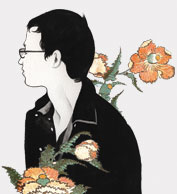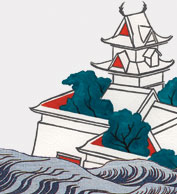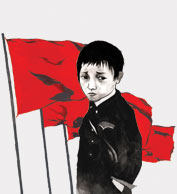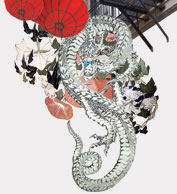STILLPOINT Archive: last updated 12/14/2007
This summer marks the 200th anniversary of the first Protestant missionary entry into China. In 1807 Robert Morrison of the London Missionary Society arrived in Canton determined to translate the entire Bible into Chinese--a project that took him 25 years to complete. Morrison's entry into China played an important part in building a bridge between the East and the West.
Two centuries later our increasingly globalized world is experiencing what Richard Foster, author of Celebration of Discipline, has termed a "massive shift in the tectonic plates of history," a shift toward Asia as the rising world culture. This shift is evident in the growth of Asian studies at Gordon--a college whose missionary "DNA" has much in common with Morrison's. In this series of articles we introduce you to some of the faculty, students and benefactors who are shaping the character and direction of the East-West connection at Gordon. Some, like associate professor of history Dong Wang, were born in China; others, like Sam Tsoi '07, are American-born Chinese or of other Asian heritage. Still others, like John Stoeckle '07 and Hannah Miller '08, have been forever changed by their study or outreach experience in Asian countries. All are--in one way or another--bicultural, with feet in both worlds.
Asian Studies Program
Story by Dong Wang
The China Studies program at Gordon is intimately linked with the East-West Institute of International Studies (EWI) and with its founding director, Rev. Raymond C. Lee. Lee is a former dean of chapel whose global vision and generosity led to the EWI's establishment in 1994 as a specialized, independently funded arm of the College, devoted to furthering East-West relations and appreciation. In October 2005 I assumed responsibility for managing and operating the Institute after Dr. Thomas Askew, the first director, retired to become director emeritus.
The EWI, housed on the third floor of the A. J. Gordon Memorial Chapel, offers high-quality East Asian programs at Gordon, both on and off campus. The College's courses in Mandarin Chinese, now overseen by the Foreign Languages Department, were launched and initially funded by the Institute. In spring 2006 the East Asian Studies minor got off the ground. Working together with the Departments of History, Economics and Business, and Foreign Languages, and the Global Education Office, the Institute oversees this new interdepartmental program. Our China courses currently include Foundations of Chinese Civilization, Mandarin Chinese, Premodern China, Modern China, Christianity in Asia, Advanced Seminars in United States-China Relations, Women in China, and Chinese Nationalism.
Along with these on-campus offerings, the EWI also sponsors international seminars featuring on-site studies in Asia. For instance, the course Economic Development in Modern China includes an 18-day China and Hong Kong tour, providing students with opportunities to experience China firsthand. And, in partnership with the Global Education Office, the EWI also sponsors off-campus semester-long study opportunities in China. The Beijing Asian Studies Program at Beijing University has continued to attract a small but steady stream of our students.
The EWI scholarships program enables students to conduct primary research in China and other Asian countries. The program has become an interdepartmental venture--professors Stephen Smith, economics and business; Robert Joss, psychology; and Ruth Melkonian-Hoover, political studies, have all served the scholarship program. In the past two years, five students have been selected for the award: Jennifer Jensen '06, John Stoeckle '07, Katelyn Anfuso '07, Rosemary Hallaren '07 and Robert Stuyck '07.
Each year the East-West Institute sponsors events that are open to the Gordon community and beyond. This past February EWI administrative assistant Shirley Houston and our student team--Ahyoung Yoo '09, Deborah Teo '07, Rebekah Suzuki '09, Monica Sakata '07 and Sally Tsai '07--organized our annual weeklong Lunar New Year Festival celebrating the richness of East Asian traditions.
We host several East-West lectures/faculty forums each semester, presented by leading scholars of Asia and offering a multidimensional approach to understanding China, the United States and other countries. This past spring Dr. John Fitzgerald of La Trobe University in Melbourne, Australia, gave the address "Revolution, Respectability and Wealth: Chinese-Australian Survival Strategies in the Era of Exclusion."
Last year the Institute became the cosponsor of the Journal of American-East Asian Relations, which is coedited by me and has a worldwide readership in North and South America, Europe and Asia. To mark the 200th anniversary of Protestant entry into China, I plan to edit a special issue, "Christianity in China as an Issue in the History of United States-China Relations," scheduled for publication in 2008. As a China historian, I am blessed to have the East-West Institute as my home base from which to carry out research and spread the College's influence in the China field through my own scholarship. Working at a Christian liberal arts college not only helps me further cultivate relationships with churches throughout Asia and North America, but has also facilitated completion of my book on Canton Christian College. Preparations for two new books, including United States-China Relations: From the 18th Century to the Present, are well underway.
The China program at Gordon College has played an active role in enhancing interactions between China and the Gordon community. Through numerous programs in Chinese language, culture, religion, history, economics, and foreign relations, the East-West Institute will continue to address challenges and opportunities in our increasingly integrated world in the 21st century.
Report From Cambodia
Story by John J. Stoeckle '07
In the fall of 2005, as a recipient of an East-West Institute scholarship I researched the history of Cambodia's medical infrastructure. I spent two weeks in Cambodia, observing hospital facilities and community development programs. I spent several hot mornings shadowing Dr. Modich, a Cambodian doctor, at a free clinic in Phnom Penh. I remember patients plagued with advanced illnesses, wholly accepting of the white man observing them, whom they then thanked profusely with the Khmer sompiah (two hands together in a praying position held high for reverence). I thanked them back with the traditional gesture. Those few days looking at X-rays for signs of tuberculosis, gowning up and holding clamps for cyst removal, while struggling to honor patients' dignity with my limited speaking ability in Khmer, humbled me and taught me something about communicating the love of the Great Healer.
I interviewed health workers in both governmental and nongovernmental organizations and gained a clearer picture of the problems of Cambodia's medical infrastructure. Finally, I attended the First Conference on the History of Medicine in Southeast Asia in Siem Reap, Cambodia, where I heard from scholars from around the world. I recently made a presentation at Gordon on "Five Hospitals--a Partial Picture of Cambodia's Struggling Health Sector," which covered the forces influencing the development of Cambodia's medical infrastructure and patterns that I observed firsthand.
Growing A Mandarin Program
Story by Paul F. Sidmore '92
Gordon's Mandarin Chinese program has had God's fingerprints on it since it began in 1996. Devotionals are an early part of our language drill; as each class opens, students sing a Christian chorus and recite a Bible verse in Chinese. By the end of their second year, Mandarin students can translate Scripture and write prayers and testimonies in Chinese characters.
People ask "How did you ever come to learn Chinese?" Paradoxically, it did not come about by my "being still and knowing." It involved a Jonah-like detour in my life that began in 1958 when, instead of coming to Gordon College as I had first planned, I enlisted in the U.S. Army to avoid being drafted. I studied Mandarin for a year at Army Language School in California, and after the Army I took a Mandarin class at Harvard Summer School.
However, at the time I had no purpose or context in which to make this study meaningful. It was not until many years later when I was at Gordon-Conwell pursuing ordination that I experienced a renewed interest in things Chinese, and was teaching ESL for a Christian organization in Boston's Chinatown. I began to develop a love of teaching, and my heart was drawn to the Chinese people.
In 1991 I began a 10-year stint as Protestant chaplain at Essex County Correctional Facility. Halfway through my chaplaincy I learned that Gordon College and its East-West Institute were looking for a Mandarin instructor, and I began teaching Mandarin three afternoons a week on the Gordon campus. In one hour I worked in the macho, paramilitary atmosphere of the jail, and in the next I interacted with a classroom of enthusiastic, godly young Gordon students.
The course soon proved viable and was fully adopted as a foreign language offering. In the fall of 1999 Gordon added Intermediate Mandarin to its first-year courses. Second-year Mandarin students typically have well-defined goals that include other Chinese studies, often pursuing programs and eventual work in China or with Chinese people in the U.S. Jenny Chang '01 now teaches children full-time in Chinatown, Boston. Liza Davis '02, now works for the U.S. government as a China specialist. Another alumna, Jessica Watters '02, is preparing to serve in rural China as a medical doctor.
Every year Mandarin classes take field trips. We have toured Chinatown, experiencing its unique sights, sounds, tastes and smells. Boston's Chinese New Year celebration is especially memorable. We also visit Boston area Chinese churches--sitting through a service conducted entirely in Mandarin is a stretching experience. These visits have also served to create a bridge for ongoing, deeper relationships between Gordon and the Boston Chinese Christian community.
Working with Director of Service Learning and Missions Kirk McClelland '97, we have put together two five-week China Summer Missions Program (SMP) trips. Three weeks are spent in Xi'an teaching conversational English--a life-changing experience for some students. The trips provide a time to explore possible callings to long-term service in China.
Team leaders Hannah Miller '08 and Katie Stone '08 were with us on the first trip, 2005, along with Malcolm Patterson, Gordon's dean of the graduate program in education. In 2006 the SMP team was co-led by Colby Smidt '09 and Katie Amico '09. Each person who went on that trip still corresponds with and prays for the friends they met in China.
In fall 2006 we began an after-school Mandarin program at Brookwood, a private school in nearby Manchester-by-the-Sea. Erin McGough '07, an education major, was the lead teacher for this new program. Katie Stone, Leslie Timm '08 and Hannah Miller have also taught prekindergarten through eighth-grade Brookwood students. This challenging venture was quite successful, and other local schools are interested in Mandarin now as well.
As we recite God's Word in our Mandarin classes, we are truly learning to be still and know that He is God; that He will be exalted among the nations. One of those nations is the great land of China. May our students be found exalting Him there.
An Immersion Experience
Story by Hannah Miller '08
I was one of the first Gordon students to participate in the Beijing program's language-immersion track. I loved going down the back streets to hang out with the vendors while they sold sweet potatoes heated over coal in big oil containers, and asking them about their lives. I understood only about a third of what they were saying, but they didn't mind--they just kept talking in their thick Beijing accents and smiling in amusement as I continued to ask questions about their lives. On my flight from Beijing to Hohhot (in Inner Mongolia) a little girl sat next to me and insisted I read the newspaper with her for the whole flight. I think I learned more characters in those 45 minutes than I did in three hours of class.
As the semester went on and our Chinese improved beyond a basic level, our conversations turned to the social and economic changes that are occurring in China and in the United States right now. The four of us--the teacher, my two classmates and I--would sit around our little table in the classroom that we occupied five hours every day, and talk about the issues that globalization and modernity are bringing to our countries. Even as my Chinese improved and my appreciation for the more tangible aspects of Chinese culture increased, my teachers gave me an even deeper, more personal understanding of their culture. They shared with me their fears as young, educated men and women entering a world fraught with uncertainty. They shared their joys as well--one of my teachers became engaged midway through the semester and talked about her hopes for her family and their future. We took field trips together to buy Chinese pop music, watch the latest Jackie Chan movie, visit museums and taste Beijing's moon cakes before the Fall Moon Festival.
China is a paradox, and I have walked in that paradox. On the dirty streets where the ritzy high rises tower over the construction workers' tents. Where the impoverished farmer pulls out a cell phone to tell his neighbor about the condition of the crops. Where the Forbidden City and the central business district can be seen in the same skyline. Where a society of guanxi (relationships) is being confronted by shangpinhua shijie (commercialization). Where society is trying to change as fast as the economy and is getting ripped apart. Where Confucius was replaced by Mao, and Mao by money, and suddenly that money seems to be failing them. Where hopes are placed on the single child in families--single children receiving more nurturing, spoiling and pressure than any other children on earth. Where every day I am confronted by a seemingly homogeneous group of people and yet still cannot articulate what the Chinese people are "like" because I've seen too many contradictions. I went to Beijing as a stranger and left it still barely understanding what it was that I experienced. But I know this city has shaped the way that I view the world.
In Peking
Story by Samuel Tsoi '07
I once heard it said that a cross-cultural experience is like a fish never knowing it is wet until it is out of the water. My own experiences prove the saying true--my awareness of my cultural identity was never more pronounced than when I studied abroad in Gordon's Beijing Program in Asian Studies in the fall of 2005. Studying in a historic city of 13-plus million and on a campus--Peking University--where international students numbered in the thousands, was quite a paradigm shift from being at Gordon. And as an Asian American, I was simultaneously attempting to prove my American identity while trying to connect with my rich Chinese heritage. I could not avoid questioning who I am in terms of my habits, cultures, values, beliefs and faith. What resulted was a feeling of being both "out of the water" and deeply immersed--a sort of cultural amphibian. But after navigating my way through a semester in China, I felt both more American and more Chinese.
Besides having strong personal motivations to experience China, I was interested in larger questions as well. How does a nation that transformed itself with unprecedented speed and scale maintain a stable society? How will the rise of the Chinese economy shake up world relations? And most poignantly, how do China's 1.3 billion people deal with such dramatic shifts and live amongst the great paradoxes of rich and poor, rural and urban, powerful and powerless, and the new and the ancient? Will this transition usher in more innovation, cooperation and hope--or turmoil, conflict and spiritual poverty?
For my generation in this globalized world, these are compelling narratives in progress. The discussions in our Sino-U.S. Relations class, the stories broadcast at my internship with the BBC, and the omnipresent Americanization of China evident in the proliferation of companies like Kentucky Fried Chicken and Starbucks, and all the skyline-protruding Western logos--all of these made me aware that as an Asian American I was part of history in the making. However, it was easy to be blinded by the glamour and not to see the inequalities, struggles and challenges of most everyday Chinese folk. It was emotionally difficult and spiritually demanding to see these realities, to digest them and to understand my own part in them.
Indeed, this story is to be continued beyond my mere taste of China two years ago. Back in the U.S. now, every time I look at the headlines and browse in libraries and bookstores I see China. I continue to be intrigued by China and committed to live out the privileges and responsibilities bestowed upon me as a follower of Jesus, a student, an American and a cultural amphibian. I am grateful for the opportunity to begin to make sense of what will happen in my generation's lifetime, and to identify the challenges and opportunities for me in that beautiful struggle.
Dong Wang is associate professor of history and executive director of the East-West Institute of International Studies at Gordon College. As research associate, she is also affiliated with the Fairbank Center for East Asian Research at Harvard University. She is the author of China's Unequal Treaties: Narrating National History and Managing God's Higher Learning: U.S.-China Cultural Encounter and Canton Christian College, among other publications.
[email protected]
John Stoeckle grew up in Melrose, Massachusetts, and has since lived in Ohio and Kentucky. He currently resides in Phoenixville, Pennsylvania, and is engaged to be married to Sarah Massanari '07 in September. They both plan to pursue medical training and serve in Southeast Asia.
[email protected]
Paul Sidmore is a part-time instructor of Mandarin at Gordon. He is grateful for the leadership, support and encouragement of Leasa Lutes, professor of Spanish, and Gregor Thuswaldner, assistant professor of German. He and his wife, Marcia, live in Danvers, close to their five children and two grandsons. Next year they will celebrate 40 years of marriage.
[email protected]
Hannah Miller is an economics and international affairs major at Gordon. During the summers she enjoys fly fishing on rivers in Minnesota.
[email protected]
Samuel Tsoi, a first-generation Chinese American and New City Scholar, was an international affairs major who participated in the Beijing semester and the Gordon in Boston program, where he was an intern at Oxfam America.
[email protected]



